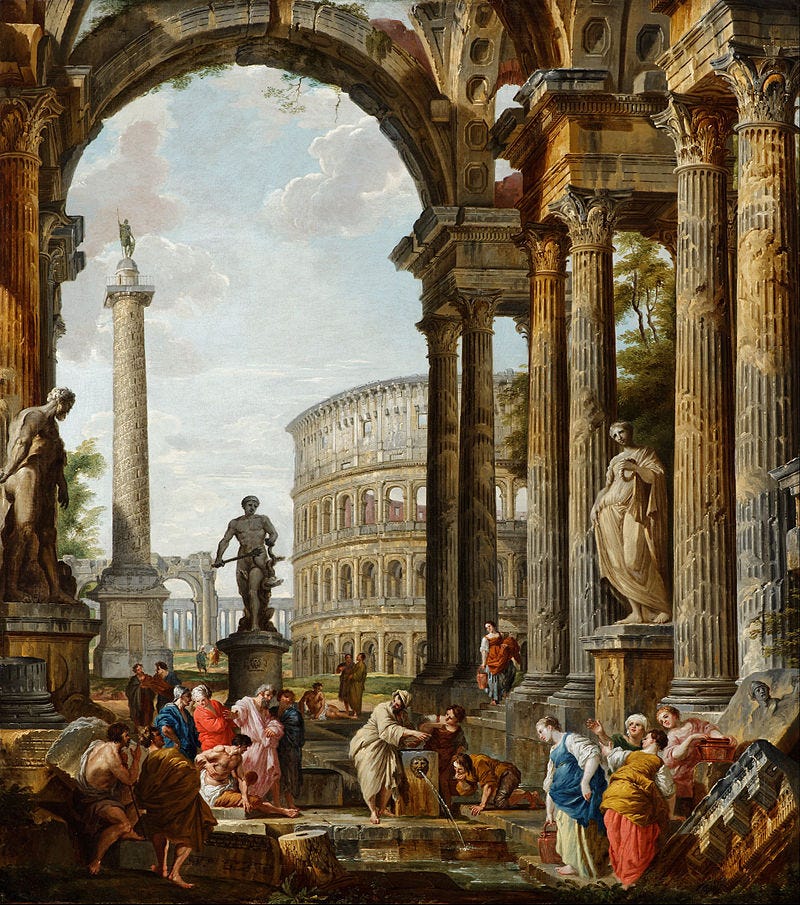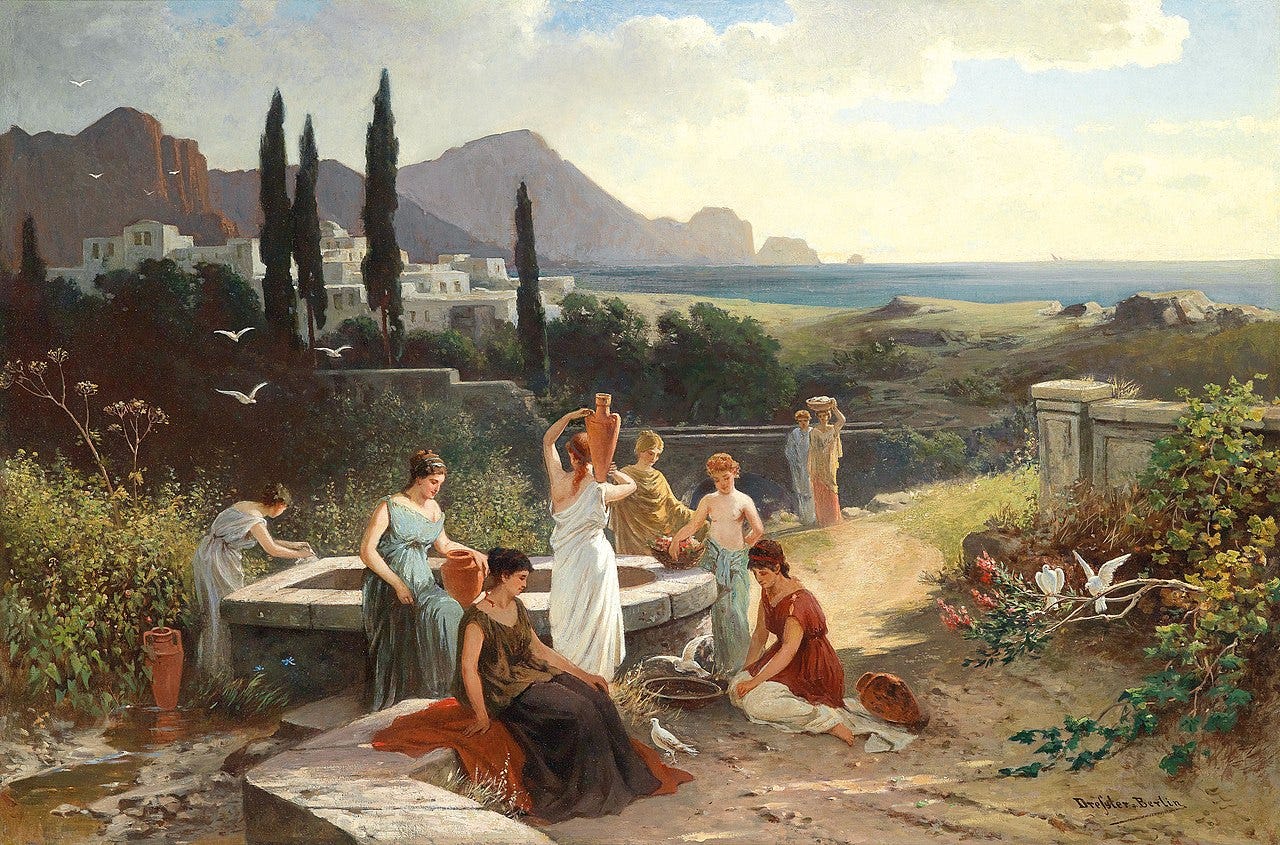And so, at first, greed for money grew, then greed for power. These things were the root, so to speak, of all evils. For avarice undermined trust, goodness, and other noble qualities, and in their place taught pride and cruelty, taught men to neglect the gods and to put a price on everything. Ambition forced many men to become liars, to hide one thing in their heart and have something else ready on their tongue, to value friendship and enmity according to convenience, not substance, and to put up a good face rather than have a good heart.
—Sallust, Catiline’s Conspiracy
Today I finished a narrative poem about an episode of the Catiline Conspiracy that highlights the divide, discussed in previous posts, between the aristocracy and the people that led to the downfall of the Roman Republic.
Catiline, a resentful nobleman spurned by his class, seeks to overthrow the government. He foments sedition on more than one occasion, gaining the favor of the discontented youth, “especially the aristocratic youth,” says Sallust, “[for] they had the resources to live at ease either lavishly or elegantly, but they preferred uncertainty to certainty, war over peace.” He promises them much: “clean slates, proscription of the wealthy, priesthoods, plunder, everything else that war and the caprice of victors can offer.” He also wins over much of the poorer population, who Sallust says are always ready for a change.
This disaffection was not confined to those who were involved in the plot: in general all the plebs were eager for revolution and approved of Catiline’s intentions. Indeed, they were seeming to do this in their particular way: for it is always the case in a community that the poor despise respectable men, they exalt the disreputable, they hate tradition and call for innovation; they are eager to change everything because they despise their own circumstances; they feed on turmoil and rebellion, and they do not care, since poverty does not cost much and cannot lose much.
But his plot is found out, and Catiline flees from the city. Eventually the uprising he forms in the provinces will be suppressed. But meanwhile, in Rome, some of his biggest supporters remain, and there is the question of what to do with them. Caesar, taking the side of the populares, and being known for his generosity and leniency, argues for mercy, while Cato, staunch defender of tradition and the rule of law, advocates for their death. He sees their participation in conspiracy and treason as an existential threat.
Cato’s side wins the day, and the conspirators are put to death. But his victory only further deepens the divide and growing distrust between those in charge and those not. The fact that no trial was held before the sentence was passed will come back to harm Cicero politically, and the optimates in general, whose exercise of power seems more and more like an abuse of it.
In a few years, when Caesar returns from Spain and holds the consulship, he will align himself with Crassus and Pompey against the aristocracy, and fill the forum with armed guards, and exercise his own authority through show of force. And it will seem no less legitimate than theirs.
He will have Cato dragged from the forum for dissenting against a bill he introduces in favor of the populares, and though it will shock many, to others it will seem justified. Elsewhere, Sallust remarks, “For in concord, small things grow; in discord, great things collapse.”
Vixerunt
When Caesar said they ought not put to death
those conspirators who were left in the city
after Catiline had fled, and that instead
they should be lenient in their punishment,
the senators were all obliged to agree.
The conscript fathers, seated in marble,
and the bystanders awaiting their word
between shadows of columns, were eager
to beat the cold and dying light of the sun,
and with all that unpleasantness be done.
Their gazes, indolent or flinty, glinted
with the promise of convenience as he
explained how they might seem more just
by doing little and showing mercy. The late
hour had stained the hall the color of rust.
But it was Cato who reminded them
of what they had forgotten, or did not
fully comprehend. Remember, he said,
that him in question, Publius Lentelus,
is a vile, mendacious dog of a man!
Expelled from the Senate for immorality,
he squandered the public funds of Sulla,
for which he offered his wrists to the tyrant
to be slapped gently; and stole his wealth
from the whole province of Sicily.
He’d have led the Gauls through the gate
to let them have their way with your wives.
Loyal to his own ambition, not the State.
Mad with prophecies of the Sibylline,
drunk with dreams of a third Cornelii.
No, fathers, it is not like the other times
when you could dole out grain for peasants
and that would do. They want your houses razed
with your families still inside. They want the City
burnt to the ground, because they hate you.
And they have reason to. They know how
you make your living, how you come to office
with modest means and leave wealthy.
They know why you vote the way you do,
and give yourselves governorships.
You don’t even hide it anymore, but flaunt
your excess and abuses as if to spite them.
Neglect of duty and gross incompetence
frustrates and mocks all their weary toil.
And what difference there might have been
between yourselves and that upstart rake,
they see none, except that he might,
to their great amusement, stain the soil
with your blood. And in your ignominy
you would bring down the whole State.
They have their reasons. So you had better
crush them so convincingly they cower
back to their caves and hang their heads
in shame; for, once domesticated, they
turn feral, and nip at your heels, and bay.
His words so struck them all with dread
at dusk they sent them off to Carcer,
Lentelus and the rest, and without trial,
had them strangled until they were dead,
as the last hand slipped from the sundial.
Nor had people been warned but waited
in the markets and the Temple of Concord
where the forum had been held, expecting
their return. The senators, unwilling
to confront the crowds, had quietly fled.
Cicero, noting with concern how they
by torchlight in the dark grew restive,
proclaimed, not what had come to pass
but a version of it they might tolerate.
They did live, he said. And the hour was late.
He marked the look of Caesar well
who’d waited with the rest, how through
the flame and shadow he could tell
the gall enkindled, and the hunger too,
and feared the omens like a dire knell.
Each act of coward, each retreating lie,
he thought, tempers their mettle against us.
Our vices are the blacksmith’s tools, and nigh
the blade is fit to wield, and to thrust,
by men like him, who swing it just to try.






